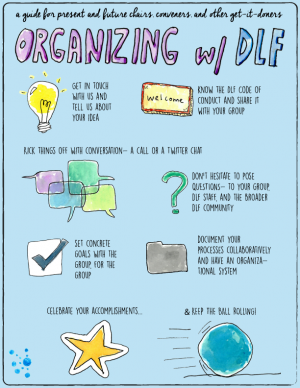Facilitating for Diversity and Inclusion: Difference between revisions
Stephbirch (talk | contribs) No edit summary |
|||
| Line 36: | Line 36: | ||
* Consider increasing the safety level of sensitive meetings by running them under the [https://en.wikipedia.org/wiki/Chatham_House_Rule Chatham House Rule]. | * Consider increasing the safety level of sensitive meetings by running them under the [https://en.wikipedia.org/wiki/Chatham_House_Rule Chatham House Rule]. | ||
* [https://www.youtube.com/watch?v=xlsx6Y75G60 Reducing Academic-Driven Harm in Chronically Exploited Communities], by Stephanie Birch, 2021 Panhandle Library Access Network Virtual Conference | |||
== Code of Conduct == | == Code of Conduct == | ||
Revision as of 11:18, 29 September 2021
| “I’m grateful to the DLF for taking their mission of inclusion seriously.”—Stacie Williams |
| “I love the inclusive, expansive, thoughtful, and community-oriented leadership [of the DLF].”—Chris Bourg |

Basic Resources
Social justice and the public good are front-and-center in DLF’s mission statement. But these are impossible goals to serve without thoughtful, conscious, welcoming, and dedicated efforts among all our working and interest groups, as well as among our staff and the volunteer committees that help organize DLF Forum. Most of all, we encourage DLF group leaders and participants to value and create conditions for humility and listening.
Below, you’ll find just a few recommended readings and toolkits for pushing against structural racism, systemic gender bias, able-ism, and other forms of oppression and exclusion that are endemic in librarianship and technology fields. This list is far from complete! We welcome your contributions.
- Culturally Connected (written from a health literacy perspective, but very useful in the GLAM context; see especially resources on cultural humility)
- Cultural Humility for Library Workers (JCLC 2018 workshop resources by Nicky Andrews and Sunny Kim)
- Social Inclusion Audit and Toolkit, Canadian Urban Libraries Council
- Code4Lib Journal Special Issue on Diversity in Library Technology
- Consider increasing the safety level of sensitive meetings by running them under the Chatham House Rule.
- Reducing Academic-Driven Harm in Chronically Exploited Communities, by Stephanie Birch, 2021 Panhandle Library Access Network Virtual Conference
Code of Conduct
In 2016, DLF staff and members of our newly-established DLF Forum Planning Committee on Inclusivity worked together to revise our Code of Conduct, which had been in place since 2012. The DLF CoC now covers activities happening under the Digital Library Federation umbrella, both in person and online, year-round. All group facilitators are asked to read this document, share with their communities, and contact us with questions or suggestions.
- Revised DLF Code of Conduct
- Blog post: “Behind the scenes: making the Forum as welcoming and accessible as possible”
Accessibility
- DLF Forum Moderator Training (2018, with thanks to Paige C. Morgan and Helene Williams)
- DLF Social Event Checklist (2018, with thanks to Carli Spina and the DLF Forum Inclusivity Committee)
Ally/Active Bystander Skills
DLF has underwritten formal Ally Skills training courses at past Forums, most recently in Milwaukee, 2016 with Bess Sadler and Mark Bussey. Leading up to the 2019 Forum, DLF's Committee for Equity and Inclusion hosted an Active Bystander Orientation, an introduction to bystander intervention and overview of active bystander strategies. Interested in having this opportunity available at a future DLF Forum or in helping us to fund opportunities like this? Let us know.
- Video: Ally Skills Workshop - Valerie Aurora of Frame Shift Consulting
- "2019 DLF Forum Active Bystander Orientation": View the recording of our live Active Bystander Orientation (presentation slides, shared note-taking document, and Zoom meeting chat transcript available)
- "Active Bystander Orientation" - DLF blog
| “The level of generosity, drive toward inclusion, & care for colleagues in the @CLIRDLF community inspires, astounds.”—Bethany Nowviskie
|
Table of Contents
- About DLF and the Organizers' Toolkit
- Working with Team DLF
- Starting a New Initiative or Working Group
- General Facilitation and Goal-Setting
- Facilitating for Diversity and Inclusion
- Communications and Consensus
- Preventing and Managing Burnout
- Gathering Info/Building Enthusiasm
- Planning an In-Person Meetup
- Setting Up Year-Round Meetings
- Planning Virtual Meetings and Webinars
- Talking and Writing
- Organizing and Sharing Your Work
- In a Nutshell

